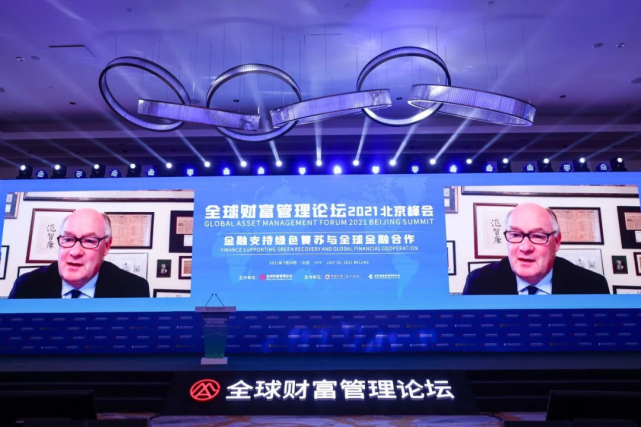安本集团董事长Sir Douglas Flint参加全球财富管理论坛2021北京峰会并作主题发言时表示,共同努力为向净零碳排放经济过渡提供资金以阻止迫在眉睫的气候危机已成为各界共识,净零碳经济是当前时代最大的商业机会之一。有效部署混合融资和战略性地利用发展融资来调动私人资本流向新兴市场和前沿市场是必由之路,需要各国资产管理公司加大合作,以减缓和适应为重点来应对气候变化。
Sir Douglas Flint建议,一是在投资时停止对碳密集型活动的投资,重点关注能够通过可持续解决方案实现向净零碳排放过渡的公司;二是将资金投向具有可信转型战略和气候解决方案的公司;三是投资于有助于适应气候变化物理效应的项目。在此过程中,还应进行国际金融合作,建立经济生态系统,以更可持续的方式重塑商业活动,从而确保未来的就业机会和子孙后代的生计,重建更美好的世界。
以下为演讲全文。
Douglas Flint 范智廉---(恒安标准养老母公司外方股东)安本集团董事长
首先,衷心感谢能有机会在这样一个关键时刻在这个重要论坛上发言。全世界都在思考,新冠肺炎疫情之后该如何重建经济活动;同时也在思考如何为迫切需要的转型提供资金,以履行建立一个净零碳排放世界的共同承诺。
如果我们要获得成功(而且我们必须成功),那将是因为我们利用了全球养老金、保险、银行、财富和资产管理行业的技能和经验,在政府主导的倡议下以及与政府主导的倡议一起,为所需的转型进行能力建设。
政策制定者和投资者早就认识到,为向净零碳排放经济转型提供资金,以阻止迫在眉睫的气候危机,需要共同的努力。我们现在已经看到越来越多的行动。因此,绿色金融在过去几年中持续增长,中国走在了这一趋势的前沿,绿色金融发展速度正在加快,预计2021年全球政府和企业将发行5000亿美元的绿色债券,接近该资产类别推出十多年来所筹集资金总额的一半。
“绿色金融”增长不仅反映了发行人致力于为“绿色复苏”作出贡献,更重要的是,使大家真正认识到现在此类融资的经济效益越来越具吸引力。联合国气候行动和融资特使马克·卡尼提到,净零碳经济是我们这个时代最大的商业机会之一。
新冠肺炎疫情及其对全球各地社区,特别是那些已经处于不利地位的社区造成的破坏性后果表明,确保向净零碳排放世界转型具有普惠性并有利于社会至关重要。“公正转型”的概念正在形成势头。现在的主流认识是,应对气候危机的努力必须考虑到对人、社会、民生、健康和生活水平的影响。这在许多方面也印证了中国“一带一路”倡议的远大目标。
毫无疑问,如果我们要在全球范围内实现这样的公正转型,我们将需要大量增加私人部门资金投入。影响力投资,即能够带来积极、可衡量的社会或环境影响以及财务回报的投资,是关键的推动因素。投资者和资产管理机构能够而且必须推动这样一种解决方案,既要解决这一时代的环境和社会挑战,又要着眼于解决地方和区域之间的的根深蒂固的不平等,从教育和就业机会到住房和健康。
有效部署混合融资和战略性地利用发展融资来调动私营资本流向新兴市场和前沿市场,这对更好发挥私营资本的规模效应至关重要。
英国和中国的企业间合作已经证明了我们可以实现怎样的互惠互利。我们联通了两国的股票市场(沪伦通),制定了可持续的融资原则以支持“一带一路”倡议的绿色发展,我们找到了支持项目可行性的方法,并证明了“一带一路”倡议符合联合国可持续发展目标。
鉴于资产管理的资产集中在较发达经济体和较大经济体的公民之中,且这些经济体的公民得到了更多的服务,因此,我的发言试图从这些国家正在发生的情况中汲取重要经验教训;同时关注后疫情时代全球资产管理行业开展的投资活动在全球范围内推动的经济增长和全球复苏;以及尤其是全球面对共同最大威胁下的紧密联系对发展中国家的影响。
作为一家国际资产管理公司,我们致力于国际金融合作,也致力于在中国展业,与中国合作。我们相信,本着全球合作的精神,负责任地应对新冠肺炎疫情冲击,对于我们渴望为子孙后代建设的世界至关重要。
我们认为,应对气候变化的最有效方式是将重点放在减缓和适应上,主要通过以下方式。
一是与公司合作推动碳减排转型,实现投资组合脱炭化。我们希望停止对碳密集型活动的投资,重点关注那些能够通过可持续解决方案实现向净零碳排放转型的公司。
二是将资金引向具有可信的转型战略和气候解决方案的公司。这些公司可能是推动向低碳经济转型的最有效途径。
三是投资于有助于我们适应气候变化物理效应的项目。如防洪、改善水管理系统和防火等。
随着债务上升到前所未有的水平,各国政府重新设定了财政预算优先事项和相关措施,同时也在想方设法联接必要的私营部门资金,以使此前政府部门签订的各种承诺继续获得融资。在这种情况下,它们被迫重新思考与私营部门相互配合。
在地缘政治层面,共同的挑战也迫使各国政府重新考虑联盟、多边主义、国家部门与私营企业的关系、集权与放权的关系,和国家和集体的责任权限,数据收集、使用的透明度以及利用此类数据支持的政策决策模型。
此外,从全球金融体系的经验中我们可以看到全球协调合作的好处。如果不是全球政策制定者和监管者在全球金融危机期间采取协调行动推动大型金融机构和市场具有更强的韧性的经验,这场新冠肺炎疫情大流行的影响可能在造成灾难性后果的同时已经引发了一场全球金融危机。这一实例证明了全球协调与合作对于分担风险的好处,重要的是我们必须利用好我们从前已学到的经验教训。
最重要的是,我们认识到全球面临的最主要挑战,气候变化、流行病、人口增长、国家之间和国家内部的经济不平等以及所有这些对移民流动的影响,仅靠国家单独行动甚至在区域层面采取行动是无法解决的,我们需要一个全球合作和资源汇集的框架,以及一个摈弃地缘政治竞争的国际协调框架。我们面对的挑战不受制于任何物理或人为的障碍,因此我们也须将准备最不充分的国家的能力与职责纳入考量,以免它们准备不足的影响压垮大多数准备充分的国家。
中国的“一带一路”倡议、最近在七国集团会议上宣布的“重建更美好的世界”等倡议,以及多边开发银行的工作都已作出重大贡献。要取得必要的成功,就需要进行国际金融合作,以建立必要的能力。这需要世界上最大的资产所有者和资产管理者的积极参与,为硬基础设施和软基础设施提供资金。这些基础设施将提高全球韧性、建立经济生态系统的同时,并创造了一个提供可持续和有吸引力回报的资产类别,为子孙后代确保一个美好的未来。举一个小例子,安本集团正与建银国际资产管理有限公司合作推进“一带一路”债券投资战略。
我们还应该利用当前全球共识的机会,抓住已有所加速的发展趋势,建设一个更有韧性的世界。比如,在我们对经济体注资的同时,我们有机会以更可持续的方式重塑商业活动,特别是在应对气候变化方面;随着数字经济在交易中所占的份额越来越大,国际金融合作变得更加重要,这既有助于促进和理解经济活动,也有助于商定如何和在何处对这些活动征税。并且,随着越来越多的数据被收集,数据本地化、数据隐私保护和数据共享政策方面的全球协作的紧迫性亦更显而易见。
同时,在以下方面,可能的话需要由私营部门牵头来进行合作,包括防范不断抬头的民族主义、民粹主义、保护主义、逆全球化、减少的多边主义、增加的非关税壁垒等,所有这些都将对金融服务跨境贸易和投融资产生不利影响,从而使全球经济出现两极分化的风险。
但我看来,合作的机会正在变多,这也是本次论坛主题之一。随着我们对全球经济复苏进行投资的同时,金融合作正在加强,我们将更好地进行经济重建。
当下,投资者希望看到自己的储蓄对社会形成良好效益,同时获得合理回报。这意味着我们要加大对生产能力和创新的投资,从而确保未来的就业机会和子孙后代的生计。因此,我们要利用养老金储蓄总额的长期的特点,从长远角度为软硬基础设施建设提供资金,从而保障当前缴费者的未来利益。虽然目前最大的储蓄池在发达国家,但未来最大的资金流动将来自增长更快的经济体,这些经济体的养老金制度可以借鉴人口老龄化更严重的国家经验,特别是在强制性储蓄计划和养老储蓄金方面,这同样是时机成熟可以加强合作的领域。
与此同时,储蓄也在日益民主化,个人承担了更多的退休计划责任。这正在创造一个需求不断增长的人口群体,他们需要根据其具体情况获得合理结构的、数字化的和透明的解决方案和建议;这一机会与恢复新冠肺炎疫情中的储蓄损失相结合。
此外,投资者普遍要求“重建更美好的世界”的压力几乎遍及全球。这意味着更低的碳排放强度、环境保护、良好的劳动实践、资源高效利用和有保证的公司治理,这些基本上都是环境、社会和公司治理(ESG)方面的因素,正是这些因素推动着如今最大规模的投资流向了获得ESG认证的项目和公司。在实现《巴黎协定》宏伟目标的道路上,中国到2060年实现碳中和的承诺既是开创性的,也是不可或缺的。中英两国在绿色金融及相关问题上有着悠久的合作历史,即将在格拉斯哥举行的第26届联合国气候变化大会和将在云南昆明举行的联合国《生物多样性公约》第十五次缔约方大会,为中英合作并协作助力实现这两次会议的目标提供了绝佳的机会。
最后,我们看到新兴市场正在开放,以鼓励创新,提高效率,并通过这种开放促进竞争中产生的最佳实践。这表明储蓄市场,尤其是数字化推动下的未来储蓄市场正日益全球化,也反映出着共同的机会的出现,这种机会来自可以吸引投资的贸易和投资的流动。中国作为全球未来最大的储蓄国,将继续开放其储蓄、养老金和资产管理市场,并于最近宣布进一步扩大双向开放,出台一系列吸引外资机构在华展业的政策,证明了这些巨大机遇更具确定性。
因此我想说,金融体系有着巨大的机会,这一机会存在于支持经济从新冠肺炎疫情中复苏,存在于以有助于建设更美好未来的方式采取的行动,以及为实现绿色复苏和最终实现净零碳排放并确保我们为更好应对下一次危机做准备而采取的行动中。英国是大多数国际金融市场的东道国,而中国是未来几十年全球经济增长的主引擎,我们有机会向世界展示,通过合作与协作,全球经济可以更快、更强地摆脱当前的衰退,并清楚地证明为共同繁荣的未来而一起努力的益处。
谢谢!
Speech at GAMF 2021 Beijing Summit
Sir Douglas Flint
24thJuly, 2021
First, let me offer my sincere thanks for having been given the opportunity to offer remarks at this important forum at such a critical time. The world is reflecting on how to rebuild economic activity post the COVID-19 pandemic and at the same time how to fund the transition urgently needed to meet shared commitments to a world of net-zero carbon emissions.
If we are to be successful – and we must be - it will because we have harnessed the skills and experience across the global pensions, insurance, banking, wealth and asset management sectors to work within and alongside government-led initiatives to build capacity for the transformation needed.
Policy makers and investors have long recognised the need to work together to finance a transition to a net-zero carbon economy to prevent the impending climate emergency. We are now seeing growing evidence of action. As a result, green finance has witnessed a sustained rise in the last few years with China at the forefront – that pace is growing - governments and companies, globally, are expected to issue $500bn in green debt in 2021, nearly half the total that has been raised since the asset class’s introduction more than ten years ago.
This growth in ‘Green Finance’ reflects not only issuers commitment to meet their contribution to the ‘green recovery’ but more importantly a real recognition that the economics of such financing is now compelling. Mark Carney, United Nations Special Envoy for Climate Action and Finance has referred to a net-zero carbon economy as one of the greatest commercial opportunities of our time.
The pandemic and its devastating consequences on communities across the globe, particularly those that were already disadvantaged, has shown that it is crucial to ensure that the transition to a net-zero world is inclusive and socially beneficial. The concept of a ‘Just Transition’ is gaining momentum. There is now a mainstream recognition that efforts to tackle the climate emergency must incorporate consideration of the impact on people, societies, livelihoods, health and living standards. In many ways, this mirrors the ambitions of China’s Belt and Road Initiative
And there is no doubt that we will need a significant increase in private funding if we are to globally achieve such a Just Transition. Impact investing – investment that delivers a positive, measurable social or environmental impact alongside a financial return – is therefore a key enabler. Investors and asset managers can and must drive solutions that address both the environmental and social challenges of our time, looking to address the entrenched inequalities that exist between and within places and regions, from education and job opportunities to housing and health.
The effective deployment of blended finance and the strategic use of development finance to mobilise private capital flows to emerging and frontier markets, will be critical to crowding in private capital at the necessary scale.
UK/China business to business cooperation has already demonstrated what can be achieved for mutual benefit as we have worked together on connecting our stock markets, developing sustainable financing principles to support the greening of the Belt and Road Initiative, finding ways to support project viability and evidencing alignment of the BRI with the ambitions of the UN’s Sustainable Development Goals.
Given the concentration of asset management assets within and activities serving the citizens of the more developed and larger economies, my comments seek to take lessons from what is happening in those countries with the important reflection that it is essential, in the post COVID world, that investment activity through the global asset management industry builds economic growth and resilience globally, with particular attention given to impacts in the developing world, given the interconnectedness of all countries with regard to the greatest threats facing the global community.
As an international asset manager committed both to international financial collaboration and to working in and with China, we believe that dealing responsibly with the aftermath of the COVID-19 crisis, in a spirit of global cooperation, is essential to the world we aspire to help build for future generations.
We believe the most effective way of tackling climate change is to focus on mitigation and adaptation, by:
1. Driving the carbon transition by engaging with companies to decarbonise portfolios. We want to move away from investing in carbon intensive activities and focus on companies that are enabling the transition to net zero with sustainable solutions
2. Directing capital towards companies with credible transition strategies and climate solutions – those that are likely to be the most effective at driving the transition to a lower-carbon economy.
3. Investing in projects that help us adapt to the physical effects of climate change, e.g. flood defences, improved water management systems and wildfire protection.
As governments reset their fiscal priorities and policies as indebtedness rises to unprecedented levels, and as they work out how to access the private sector capital pools essential to funding the commitments they have signed up to, they are being forced to rethink their interactions with the private sector.
At a geopolitical level, the shared challenges are also forcing governments to reconsider alliances, multilateralism, the role of the state versus private enterprise, centralised versus devolved powers and responsibilities within countries and the collection, use and transparency of data and the decision-making models into which such data is fed to support policy choices
There is also a reflection that speaks to the benefits of co-ordinated global cooperation gained from experience within the global financial system – had it not been for the coordinated actions taken during the global financial crisis by policy makers and regulators across the world to force greater resilience into the largest financial institutions and market places, the impact of this pandemic would have precipitated a global financial crisis at the same time as the pandemic with disastrous consequences. The benefits of global coordination and cooperation for shared risks are borne out by this example. It is imperative that we use the lessons learned.
Most important is the recognition that the major challenges facing the world – climate change, pandemics, population growth, economic inequality between and within countries and the impact of all of these on migration flows, are incapable of being solved by nations acting alone or even regionally – a framework of global cooperation and resource pooling will be needed with an international coordination framework that sets aside geopolitical rivalries. The challenges we face respect no physical or man-made borders, so we need to reflect on the capabilities and capacities of the least prepared nations, lest the impacts of their inadequacies overwhelm the most prepared nations.
Initiatives such as China’s Belt and Road Initiative, the recently announced Build Back Better World at the G7, together with the work of the Multilateral Development Banks have a significant contribution to make; to be as successful as these need to be will require international financial collaboration to build the necessary capacity. This will require the active participation of the world’s largest asset owners and asset managers to fund the hard and soft infrastructure that will improve global resilience and at the same time create an asset class offering sustainable and attractive returns while building the economic ecosystem to secure a future for future generations. As one small example, atabrdnwe are partnering with CCB International Asset Management in a Belt and Road bond strategy.
We should also take the opportunity of the current global consensus to build a more resilient world by accelerating trends already underway – as we recapitalise economies we have the opportunity to reshape business activity in a more sustainable way, notably with regard to climate change; as digital business takes an ever greater share of transactions, international financial collaboration becomes even more important both to facilitate and to understand economic activity and to agree how and where to tax such activity; and as ever more data is collected, the urgency of global collaboration on data localisation, data privacy and data sharing policies is clear.
And we need cooperation, possibly led by the private sector, to guard against growing nationalism, populism, protectionism, de-globalisation, reduced multilateralism, increased non-tariff barriers all of which will adversely impact capacity for financing cross border trade and investment, risking a polarised global economy.
But in my opinion the opportunities are greater and arise from a theme of this forum – that of cooperation – building back better as we invest in the global economic recovery and bolster financial cooperation.
· Today’s investors want to see their savings do good, as well as make a decent return. That means ensuring greater investment in the productive capacity and innovation that will secure the future jobs and livelihoods of future generations. It means harnessing the aggregate pools of pension savings to use their ability to take a long-term perspective to fund the hard and soft infrastructure that will secure the type of future current contributors seek. While the largest pools of savings are today in the developed world, the largest future flows will come from the faster growing economies whose pension systems can learn from the experience of the demographically older countries – particularly with regard to mandatory savings schemes and workplace pensions - again areas ripe for greater cooperation
· Alongside this is the growing democratisation of savings – that is more responsibility for retirement planning resting with the individual; this is creating a growing body of the population with demand for and need of advice and well-structured, digital and transparently delivered solutions to their particular circumstances; this opportunity is now combined with the need to build back savings lost in the pandemic.
· There is near universal pressure from investors to ‘build back better’ meaning lower carbon intensity, environmentally protective, sound labour practices, resource efficient, governance assured – essentially all of the ESG factors that are driving the largest investment flows today into funds that are mandated to invest in ESG accredited projects and companies. China’s commitment to achieve carbon neutrality by 2060 is both ground-breaking and essential if we are to meet the ambitions of the Paris Agreement. The UK and China have a long history of cooperation on Green Finance and related issues and with the upcoming COP26 Climate Change Conference in Glasgow and the COP15 Convention on Biodiversity in Kunming there is an exceptional opportunity for UK-China cooperation and collaboration to strengthen the ambitions and goals of both conferences
· Finally, we are seeing emerging markets open to encourage the innovation and improved efficiency and best practices that arise from the competition encouraged by such opening up. This recognises that the savings world, particularly that of the future enabled by digitalisation is increasingly global – mirroring the world of shared opportunity that the trade and investment flows which attract investment are building. China as the largest prospective savings pool in the world continues to open up its savings, pensions and asset management markets and the recent spate of announcements of foreign institution expansion into China bear witness to the scale of the opportunities recognised.
So let me conclude by saying the financial system has a huge opportunity to be seen as supporting recovery from the consequences of COVID-19, to be seen to do so in a way that contributes to a better future, to do so in a way that facilitates delivery of a green recovery and a net-zero destination and ensures we are better prepared for the next crisis.
The UK as the host to the most international of financial markets and China as the engine of incremental global economic growth over the next several decades have the opportunity to demonstrate to the world that through collaboration and cooperation the global economy can emerge faster and stronger from the current downturn and evidence clearly the benefits of working together for a future of shared prosperity.
Thank you.
新闻线索:中国财富管理50人论坛








 全国客户服务、投诉电话:956069
全国客户服务、投诉电话:956069
 津公网安备 12010102000823号
津公网安备 12010102000823号